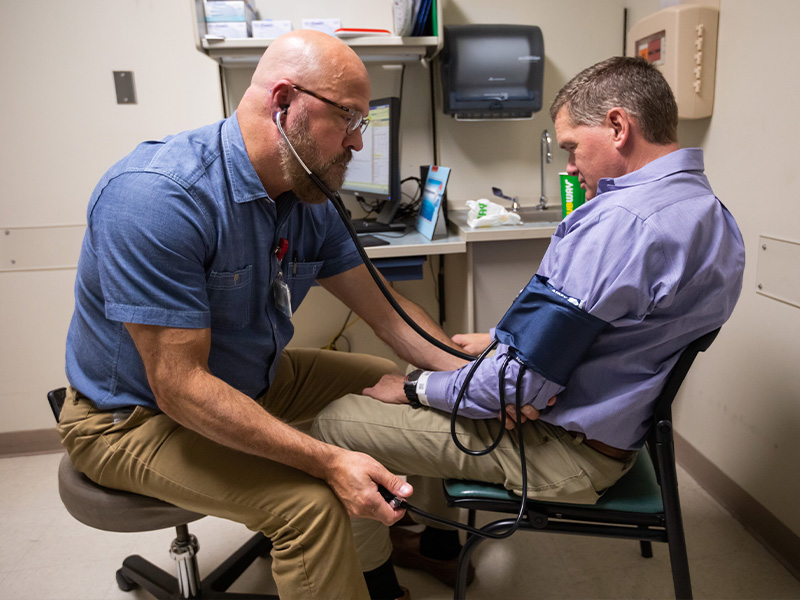
The University of Mississippi Medical Center opened Mississippi’s first LGBTQ health clinic in September to help serve a community that advocates say is in need.
The medical center opened a mental health facility for LGBTQ people in 2015, but many people who visited that clinic needed their physical medical needs met as well.
“We had patients coming to that clinic who were asking about primary care issues like managing their hypertension and diabetes,” Scott Rodgers, co-director of the Center for LGBTQ Health, said. “That’s not what we do in psychiatry, so we realized we needed more.”
Rodgers said that UMMC opened the mental health clinic after reviewing research about suicide and depression rates among LGBTQ individuals.
“There’s been a lot of interest around the country … in creating specialty clinics to serve the community because of the health disparity that the community faces and there was just nothing in-place in Mississippi,” Rodgers said.
The Trustworthy, Evidence-based, Affirming, Multidisciplinary Care (TEAM) clinic is the fourth clinic of its kind to be opened in a southeastern academic medical center. The University of Alabama at Birmingham, Duke University and Vanderbilt University house the other three.
Kevin Cozart, operations coordinator for the Sarah Isom Center for Women and Gender Studies, said LGBTQ people face many different issues when seeking healthcare, and the problems someone might face often differ with the diverse identities within each community.
“You have gay men who go in and want to get routine HIV testing, and there is a conscious or unconscious look of displeasure,” Cozart said. “They’re trying to be proactive with their health, but certain health professionals are judging them for being sexually active outside of marriage.”
Health issues within the transgender community, like access to counseling, hormone replacement therapy and sex reassignment surgeries are the fastest growing LGBTQ health concerns, Cozart said.
“At some level, it’s not typical medical training,” Cozart said. “There are just too few people, I would say, in the state of Mississippi, but probably nationally, who have continuing training or primary training on trans issues to help them serve the trans community medically.”
Cadence Pentheny, the coordinator for LGBTQ+ programming and initiatives on campus, said they have been working with the student health center to offer more LGBTQ-specific services and educate health center employees about LGBTQ health needs.
One of the services that the health center offers is the prescription of pre-exposure prophylaxis (PrEP) medication. PrEP is a preventative drug that combats the transmission of HIV with a 92-99% efficacy rate.
“As we know, for a huge majority of the LGBTQ population, HIV transmission can be a big issue for other reasons of combatted oppression,” Pentheny said. “(PrEp is) a super, super, important thing that people should have access to, if that’s what they want to do, and to keep themselves safe.”
Most of Pentheny’s work with the health center has been educational. Student Health Services now distributes flyers with information about LBGTQ-specific services that they offer. The health center will also refer students to other facilities if they cannot meet their specific needs.
“I think the biggest change is just the general awareness of the unique needs and those things that students are looking for,” Pentheny said.
The Human Rights Campaign (HRC) uses the Healthcare Equality Index (HEI) to measure health facilities’ policies and practices in relation to LGBTQ inclusion. UMMC is rated as a top performer in the index with a score of 90 out of 100 in 2019.
UMMC and Ochsner Medical Center on the Mississippi Gulf Coast are rated as a top performers. The Veterans Affairs in Jackson and in Biloxi are ranked as an LGBT Healthcare Equality Leaders.
Hill said the HRC is working to get more healthcare facilities in the state to participate in the survey each year. Rodgers contacted Mississippi HRC Director Rob Hill when the TEAM clinic was in development.
“We’ve been really excited about the relationship we’ve been able to build with UMMC,” Hill said. “Over the last few years we’ve worked directly with them to make sure they were participating in the HEI, but also making sure we’re helping them to get them any kind of support and answer questions that they have to make sure they’re providing and LGBTQ inclusive environment.”
Incompetence and negative stigmas go hand-in-hand for LGBTQ people trying to find healthcare in Mississippi, according to Hill.
“Unfortunately, very often, people’s religious beliefs or the kind of teaching that they experience perpetuate the kind of lack of acceptance that is necessary to change,” Hill said. “Stigma is still high. There’s just this basic fear around people being able to tell their stories.”
The HRC used the HEI to educate health facilities on the best ways that they can accommodate their LGBTQ patients and people often use it as a reference for where they want to receive their healthcare.
Rodgers said most doctors want to provide the best care that they can to their LGBTQ patients.
“The challenge is simply learning best practice guidelines, many of which are relatively new, (and) our clinic is designed to be up-to-date with these guidelines,” Rodgers said. “We expect to play a leading role in advancing care for the LGBT population in the state.”
The TEAM Clinic is open the first Friday of every month and does not have plans to expand. Appointments can be made by phone and information requests can be made through email.



























